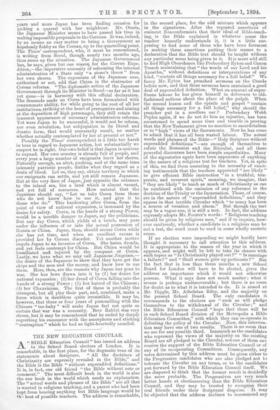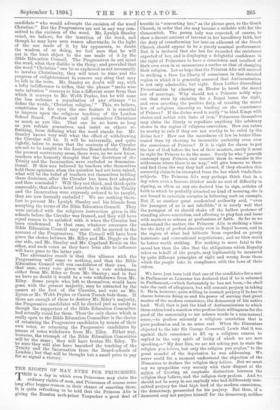THE NEW EDUCATION CIRCULAR. A " BIBLE Education Council" has issued
an address to the School Board electors of London. It is remarkable, in the first place, for the dogmatic tone of its statements about Scripture. " All the doctrines of Christianity are expressly revealed in the Bible," and the Bible is the Bible " without superadded definitions." It is, in fact, our old friend " the Bible without note or comment." The most difficult book in the world is also the one book in the world which needs no explanation. The " actual words and phrases of the Bible " are all that is wanted in religious teaching, and a parrot who had been kept from hearing anything but Bible language would be th i beat of possible teachers. The address is remarkable, in the second place, for the odd mixture which appears in the signatures. After the repeated assertions of eminent Nonconformists that their ideal of Bible-teach- ing, is the Bible explained in whatever sense the teacher honestly understands it, it is a little sur- prising to find some of those who have been foremost in making these assertions putting their names to a declaration that the Bible text should be taught without any particular sense being given to it. It is more odd still to find High Churchmen like Prebendary Eyton and Canon Trench maintaining that "the words of our Lord and his Apostles," without definitions or interpretations of any kind, "contain all things necessary for a full belief." We fancy Mr. Eyton has preached sermons on the Creeds before now, and that these sermons have contained a good deal of superadded definition. What an amount of super- fluous labour he has given himself in deference to old- fashioned notions about the place of the pulpit. When the second lesson and the epistle and gospel " contain all things necessary for a full belief," why should the preacher put in a needless oar ? Prebendary Webb Peploe again, if we do not do him an injustice, has been accustomed to spend some time and trouble in proving that the New Testament gives no sanction to sacerdotalism or to " high" views of the Sacraments. Now he has come to admit that it has all been wasted labour. The actual words and phrases of the Bible—" Holy Scripture without superadded definitions "—are enough of themselves to refute the Romanist and the Ritualist, and all these powerful discourses have been simple superfluities. Many of the signatories again have been opponents of anything in the nature of a religious test for teachers. Yet, in spite of this, we find them assenting to the necessity of exact- ing testimonials that the teachers appointed " are likely " to give efficient Bible instruction " in a truthful, tem- perate, and reverent spirit," meaning, we imagine, that " they are likely " to teach as much of Christianity as can be combined with the omission of any reference to the doctrine of the Trinity or the Incarnation. These, of course, are in the nature of " superadded definitions," and they appear in that terrible Circular which " to many has been a source of vexation and alarm." But though the test may be a vague one, it is still a test. In fact, the address expressly adopts Mr. Forster's words : " Religious teaching should be given by religious men," and if to inquire, how- ever cautiously, whether a candidate is a religious man be not a test, the word must be used in some wholly esoteric sense.
If no election were impending we might hardly have thought it necessary to call attention to this address. It is appropriate to the season of the year in which it appears, and might well be left to take its chance with such topics as "Is Christianity played out ?" " Is marriage a failure ?" and " Shall women give up petticoats 9" But the fact that in less than three months a new School Board for London will have to be elected, gives the address an importance which it would not otherwise possess. What it says does not much matter ; what it means is perhaps undiscoverable ; but there is no room for doubt as to what it is intended to do. It is aimed at Mr. Diggle, Mr. Athelstan Riley, and the majority on the present School Board. The only candidates it recommends to the electors are " such as will pledge themselves to the withdrawal of the Circular;" and the Bible Education Council " hope that there will be in each School Board division of the Metropolis a Bible Education Committee," with which they can co-operate in defeating the policy of the Circular. Now, this interven- tion may have one of two results. There is no room that we see for any possible third. Inasmuch as the candidates who represent the views of the majority on the existing Board are all pledged to the Circular, not one of them can receive the support of the Bible Education Council or of any of its co-operating Committees. Consequently, any votes determined by this address must be given either to the Progressive candidates who are also pledged not to tolerate the Circular on any terms, or to the candidates put forward by the Bible Education Council itself. We are disposed to think that the former result is decidedly the more probable. The Progressives are very much better hands at electioneering than the Bible Education Council, and they may be trusted to recognise their real friends under their Scriptural disguise. It may be objected that the address declines to recommend any candidate " who would advocate the excision of the word. Christian." But the Progressives are not in any way com- mitted to the excision of the word. Mr. Lyulph Stanley voted, we believe, for the insertion of the word, and though he may have seen reason afterwards, in the light of the use made of it by his opponents, to doubt the wisdom of so doing, we feel sure that he will not in the least object to the use made of it by the Bible Education Council. The Progressives do not mind the word, what they dislike is the thing ; and provided that the word " Christian" can be so explained as not necessarily involve nvolve Christianity, they will trust to time and the progress of enlightenment to remove any sting that may be left in the term. Mr. Stanley no doubt will say, with a lofty indifference to trifles, that the phrase " make wise unto salvation" conveys to him a different sense from that which it conveys to Mr. Webb Peploe, but be will none the less welcome a repudiation of any attempt " to define the words, Christian religion.' " This, we believe, constitutes in his eyes the one feature it is essential to impress upon the religious teaching of the London School Board. Profess and call yourselves Christians as much as you like. That can do no harm so long as. you refrain yourselves, and. insist on others re- framing, from defining what the word stands for. Mr. Stanley knows very well what the effect of withdrawing the Circular will be. It will be universally, and quite rightly, taken to mean that the contents of the Circular are not to be taught in the London Board-schools. Before the present controversy arose, there were, as we now know, teachers who honestly thought that the doctrines of the Trinity and the Incarnation were excluded as denomina- tional. If this was believed by teachers who themselves held these opinions, when the question had not been raised, what will be the belief of teachers not themselves holding these doctrines, after the Circular has been first adopted and then rescinded ? Will they not think, and think quite reasonably, that after a brief interlude in which the Trinity and the Incarnation were expressly ordered to be taught, they are now formally excluded ? We see nothing there- fore to prevent Mr. Lyulph Stanley and his friends from accepting the terms of the Bible Education Council. They were satisfied with the religious instruction given in the schools before the Circular was framed, and they will have equal reason to be satisfied with it when the Circular has been condemned. In that case, whatever successes the Bible Education Council may score will be carried to the account of the Progressives. The Council will have been given the choice between Mr. Riley and Mr. Diggle on the one side, and Mr. Stanley and Mr. Copeland Bowie on the other, and such votes as they have been able to influence will have gone to the latter pair. The alternative result is that this alliance with the Progressives will come to nothing, and that the Bible Education Council will run candidates of their own. In that case, every vote given will be a vote withdrawn either from Mr. Riley or from Mr. Stanley ; and in fact we have no doubt it would be a vote withdrawn from Mr.. Riley. Some people who, left to themselves, would have gone with the present majority, may be attracted. by the names at the foot of the Circular, and vote as Mr. Eyton or Mr. Webb Peploe or Canon Trench bids them. If there are enough of these to destroy Mr. Riley's majority, the Progressive candidates will be elected just as surely as though the supporters of the Bible Education Committee had actually voted for them. Thus the only choice which is really open to the Bible Education Committee is the choice of returning the Progressive candidates by means of their own votes, or returning the Progressive candidates by means of votes withdrawn from Mr. Riley. Either way, however, the triumph of the Bible Education Committee will be the same ; they will have beaten Mr. Riley. To be sure they will also have banished the teaching of the Trinity and the Incarnation from the Board-schools of London ; but that will be thought but a small price to pay for so signal a victory.



































 Previous page
Previous page